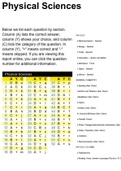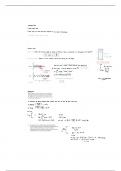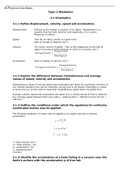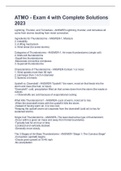Dissipative forces - Study guides, Class notes & Summaries
Looking for the best study guides, study notes and summaries about Dissipative forces? On this page you'll find 4 study documents about Dissipative forces.
All 4 results
Sort by

-
MCAT TPR Exam 3
- Exam (elaborations) • 133 pages • 2022
-
- $19.99
- + learn more
1. A decrease in the temperature of a gas sample in a closed container will always result in an increase in the: A. value of the PV / (RT) ratio. kinetic energy of individual gas molecules. C. gas pressure on the container. D. attraction between gas molecules. Correct Explanation: D. Since the temperature of a gas is proportional to the average kinetic energy of its molecules, decreasing the temperature will result in a decrease in kinetic energy. This decrease in kinetic energy will ...

-
Class notes PHYS 1151 (PHYS1151)
- Class notes • 2 pages • 2024
- Available in package deal
-
- $5.99
- + learn more
Dissipative Forces Physics Notes

-
IB-Physics-Core-Notes
- Class notes • 63 pages • 2022
-
- $15.49
- + learn more
IB-Physics-Core-Notes Topic 2 Mechanics 2.1 Kinematics 2.1.1 Define displacement, velocity, speed and acceleration. Displacement- Defined as the change in position of an object. Displacement is a quantity that has both direction and magnitude, it is a vector. Measured in metres. Speed- How far an object travels in a given time. Rate of change of distance (ms-1) Velocity- The vector version of speed. Tells us the magnitude of how fast an object is moving and the direction in wh...

-
ATMO - Exam 4 with Complete Solutions 2023
- Exam (elaborations) • 11 pages • 2023
-
Available in package deal
-
- $11.49
- + learn more
Lightning, Thunder, and Tornadoes - ANSWER-Lightning, thunder, and tornadoes all come from storms resulting from moist convection. Ingredients for Thunderstorms - ANSWER-1. Moisture 2. Instability 3. A lifting mechanism 4. Wind shear (for some storms) Categories of Thunderstorms - ANSWER-1. Air mass thunderstorms (single cell) 2. Multi-cell thunderstorms -Squall-line thunderstorms -Mesoscale convective complexes 3. Supercell thunderstorms Characteristics of Thunderstorms - ANSWER...

Study stress? For sellers on Stuvia, these are actually golden times. KA-CHING! Earn from your study resources too and start uploading now. Discover all about earning on Stuvia


